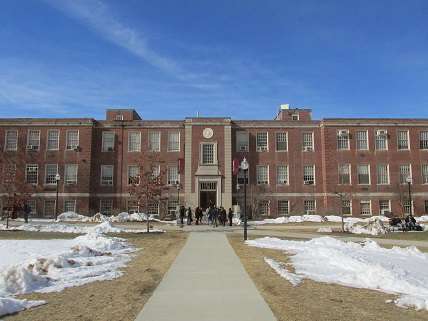Headline of the Day: 'UMass to Review Policy on Students as Confidential Drug Informants'


That eyebrow-raiser comes from Inside Higher Ed, which provided a brief synopsis of a very curious program at the University of Massachusetts at Amherst. University police apparently caught a student, "Logan," selling LSD in a club a year ago. Normally, this would have led to criminal charges, a school suspension, and parental notification; instead, administrators offered to bury the matter and drop the punishments.
All Logan had to do was become an undercover drug informant for UMass, according to an unbelievable Boston Globe story.
Logan accepted—it was "an offer I can't refuse," he told his friends—and became an undercover UMass police informant. His codename was CI-8. He did his job and helped the university catch at least one other dealer.
A year later, his parents—who had no idea about his troubles with drugs—found him dead of a heroin overdose.
Now some are wondering whether forcing Logan to stay in the drug culture in order to ferret out other dealers was the best thing for him, given his addiction:
If Logan had not become an informant, he would have faced expulsion from his dorm and suspension from school under the UMass substance abuse policy, and, if the dean of students found he was guilty of the offenses, his parents would have been notified. He also could have been ordered to attend a drug education program.
Instead, Logan was enabled to keep his addiction a secret from his family. After briefly going cold turkey in the late spring of 2013, he was using again by the middle of July, his text messages show. Looking ahead to the fall at UMass, he texted one friend that his apartment would be the "shootup den."
UMass has announced plans to review the drug informant policy, at least:
The university defended the program, but said it will review whether to require informants in drug cases to get help for possible addictions and whether to notify parents when a student is recruited into the program.
"The assessment will help determine whether the confidential informant program can operate successfully with a mandatory referral to an addiction specialist or notification to a parent . . . while maintaining a program that deters distribution of illegal, lethal drugs," UMass said in a statement.
A university conscripted a student-addict into dangerous undercover police work that could have gotten him killed—and in a way, it eventually did. Ladies and gentlemen, your War on Drugs.
Editor's Note: As of February 29, 2024, commenting privileges on reason.com posts are limited to Reason Plus subscribers. Past commenters are grandfathered in for a temporary period. Subscribe here to preserve your ability to comment. Your Reason Plus subscription also gives you an ad-free version of reason.com, along with full access to the digital edition and archives of Reason magazine. We request that comments be civil and on-topic. We do not moderate or assume any responsibility for comments, which are owned by the readers who post them. Comments do not represent the views of reason.com or Reason Foundation. We reserve the right to delete any comment and ban commenters for any reason at any time. Comments may only be edited within 5 minutes of posting. Report abuses.
Please to post comments


Fuck this goddam War on Drugs in the fucking neck!
Absent the war on drugs, wouldn't he have just been allowed to continue his now perfectly legal drug use and overdosed anyways? Not saying their confidential informant policy is a good thing, but in this case it seems that Logan's death was entirely his own doing.
Probably not; Bayer probably would not be altering the purity of the drugs they were selling via Walgreens and CVS. Users generally overdose when they get more than they bargained for (or they overestimate their tolerance after a period of sobriety).
His death was his own fault, for sure, but just maybe being coerced into snitching lowered his concern for his life. Not saying he sepukku'ed himself, just that he might have cared a bit less, knowing what a scumbag the authorities forced him to be.
He was not coerced anymore than a minimum wage Walmart worker is coerced. Less so because of the Walmart worker doesn't take the job he starves this kid would just have to go to community college.
"Normally, this would have led to criminal charges, a school suspension, and parental notification; instead, administrators offered to bury the matter and drop the punishments."
Yeah being an informant sounds like a real party. I'm sure he had a blast.
Why would his parents have been notified? Was he underage?
Because he's a college "kid," of course.
I can't wait for NCAA Boys basketball to begin again.
My first thoughts too.
Because they were paying thousands of dollars to send him to college?
Because said college was forcing him into a very high-risk situation?
Try getting your college kid's grades without their permission.
Normally, this would have led to criminal charges,
Normally, this is a transaction between consenting adults and nobody else's business.
No that's not true at all.
Meh. On the drug war outrage scale, this barely rates.
Why would the University Police have jurisdiction if he was selling the LSD in a club?
A year later, his parents?who had no idea about his troubles with drugs?found him dead of a heroin overdose.
one wonders if someone found out he was a CI and passed him a Hot Shot(tm)?